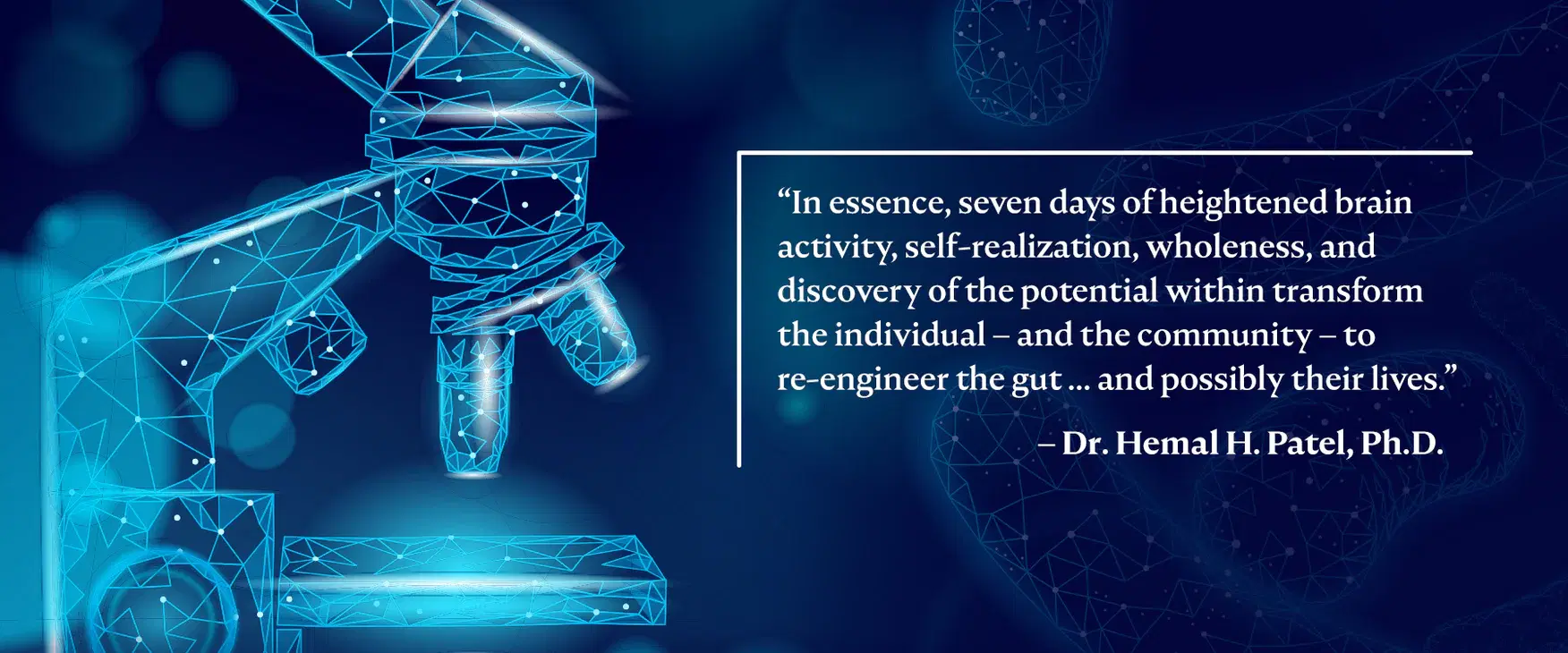A Note from Hemal H. Patel, Ph.D
Hemal H. Patel, PhD | 26 August 2022
Hi, everyone,
I want to take a moment and introduce you to my dear friend and colleague Dr. Hemal Patel, who is Professor and Vice Chair for Research in the Department of Anesthesiology at the University of California, San Diego. I thought it would be nice for him to let you know how things are going with the research we are doing on all of you. So, for those of you who have not yet met him, here is Dr. Hemal.
You Are What You … Think
Many of us can relate to the saying, “You are what you eat,” as it evokes thoughts of our youth – and our parents doting over us to eat the right food to nourish, replenish, sustain, and maintain our body and mind for health.
The consumption of this raw material requires digestion and conversion to fuel sources that ultimately allow us to heal, be empowered, and thrive. At the core of this process is a deal struck between complex life and tiny microbes billions of years ago.
The endosymbiotic theory proposes that, as cells got more complicated, there was an incorporation of proteobacteria (mitochondria) and cyanobacteria (chloroplasts) into animal and plant cells, respectively. This symbiosis allowed complicated life to undertake energetically favorable biochemical processes to generate energy to grow, complicate, and expand.
Eukaryotic cells, with a nucleus and other membrane-bound organelles, allowed for more organized and complex functions to evolve. The eventual rise of multicellular systems working in concert created order and hierarchy in the animal and plant kingdoms. Organisms began to take shape – and the pinnacle, we humans would argue, would be Homo sapiens, with a large and complex brain capable of shaping and transforming the world around us.
As we learn more about who and what we are, we find the symbiotic relationship with the most abundant, long-lived, and diverse organisms on planet Earth – microbes – continues to evolve. Our gut microbiome, which processes what we eat, turns out to control a lot about who we are.
Microbes are numerous (there are more on the back of our hand than the number of people on Earth – 100 trillion in a single human body); diverse (they have 3.3 million unique genes compared to a mere ~22,000 in humans); and differentiating (humans are 99.9 percent similar to each other genetically, but 80-90 percent of how different we are from each other is based on our microbe content).
Some suggest there is a gut-brain axis that regulates our thoughts and behaviors, a gut-heart axis that regulates adaptation to stress, and numerous other gut-to-everything axes that regulate virtually every process.
This puts at odds the notion of symbiosis and who is in control: the human with the large, complex brain? Or the microbes that outnumber and dominate their host?
In January of this year, we launched a bold study called QUANTUM (QUest to ANalyze a thousand hUmans Meditating) to look at 1,000 people at a Week Long Advanced Retreat to understand their individual and collective experiences. Not only were we assessing changes in their health status, but confirming this by looking at biometrics and biological assessment – one of which was to profile changes before and after the week-long event on the gut microbiome.
An early look at the potential of what QUANTUM represents was nothing short of exciting and groundbreaking (for example, at least 18 diseases with more than 30 subjects represented; ~800 matched samples before and after the event).
Early data suggests that nearly everyone at the event had significant shifts in their gut microbiome – and subsets of individuals with various diseases shifted their microbiome in seven days to look more and more like healthy individuals in QUANTUM.
This effect was independent of the food participants ate. In essence, seven days of heightened brain activity, self-realization, wholeness, and the discovery of the potential within transform the individual – and the community – to re-engineer the gut … and possibly their lives.
Engaging our large, complex brain has consequences.
These early findings confirm what we’ve long seen in testimonials of people in this work. It’s less a matter of: “You are what you eat” … and much more a matter of: “You are what you think.”
Exciting news: QUANTUM 1.5 is happening this week in Marco Island, Florida – where we’ll work with 50 students who were part of the original study. And we’ll be launching QUANTUM 2.0 in Orlando, Florida, in November. Stay tuned for more updates.

Comments